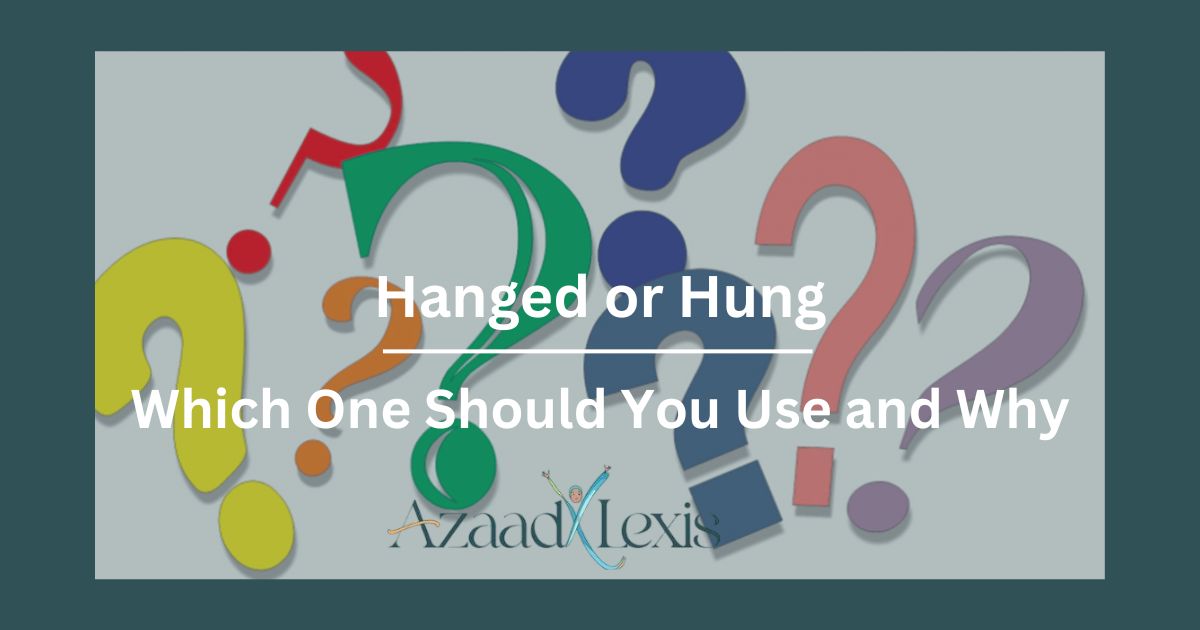English is filled with nuances and peculiarities that can sometimes perplex even the most seasoned speakers. One such common point of confusion arises from the words “hanged” and “hung.”
Both words are past tense forms of the verb “hang,” yet they are not interchangeable and are used in different contexts. This article aims to clarify their meanings and correct usage, providing practical examples to guide you through the nuances of these often-misused terms.
Understanding Hanged And Hung
Before diving into definitions and examples, it’s essential to understand the broader context of these terms. The verb “hang” has two distinct past tense forms: “hanged” and “hung.” The key to determining which one to use lies like the action being described.
Hanged: Definition and Usage
The word “hanged” specifically refers to executing by suspension. In historical and legal contexts, “hanged” is used when discussing someone who has been executed by hanging, often as a form of capital punishment. This usage is deeply rooted in legal and formal language.
Example:
- In the 18th century, many criminals were hanged for their crimes.
- The notorious outlaw was hanged at dawn after the trial.
Notice that in these examples, “hanged” is used exclusively in the context of execution. It is important to remember that this form should not be used for other meanings of “hang.”
Hung: Definition and Usage
On the other hand, “hung” is used for all other contexts where “hang” refers to suspending or attaching something from a point above. This can apply to objects, artwork, or even situations where a person is suspended in a non-execution context.
Example:
- The painting was beautifully hung in the gallery.
- They hung the decorations all around the room for the party.
- The laundry was hung out to dry on the clothesline.
In these scenarios, “hung” correctly describes actions unrelated to execution. The broad application of “hung” makes it a more commonly used term in everyday language.
Read this Blog: Cappuccino Or Latte: Which One Should You Choose?
Side-by-Side Comparison
To further clarify, let’s place “hanged” and “hung” side by side:
| Hanged | Hung |
| Refers to execution by hanging | Refers to suspending objects or people |
| Used in legal and historical contexts | Used in everyday language for objects, art, etc. |
| Example: The criminal was hanged. | Example: The painting was hung on the wall. |
By seeing these terms in a direct comparison, the distinction becomes clearer, helping to solidify when to use each word.
Everyday Usage Examples
Understanding the difference between “hanged” and “hung” is crucial, but seeing them in everyday usage helps drive the point home. Let’s explore a few more examples:
- Hanged in context:
- The convicted murderer was hanged after a lengthy trial.
- In many countries, the death penalty by hanging has been abolished.
- Hung in context:
- She hung the curtains carefully to ensure they were even.
- The children hung their stockings by the fireplace on Christmas Eve.
- He hung onto the rope tightly, trying not to fall.
These examples demonstrate the proper application of both words in scenarios you might encounter in daily conversation or writing.
Conclusion
Distinguishing between “hanged” and “hung” boils down to the context in which the verb “hang” is used. “Hanged” is reserved strictly for execution by hanging, a usage that is now relatively rare but still important in historical and legal discussions. Meanwhile, “hung” serves a broader function, from hanging pictures to drying clothes.
By keeping these distinctions in mind, you can confidently choose the correct word, avoiding a common pitfall in English usage. Whether discussing historical events or everyday activities, using “hanged” and “hung” appropriately ensures clarity and precision in your language.

